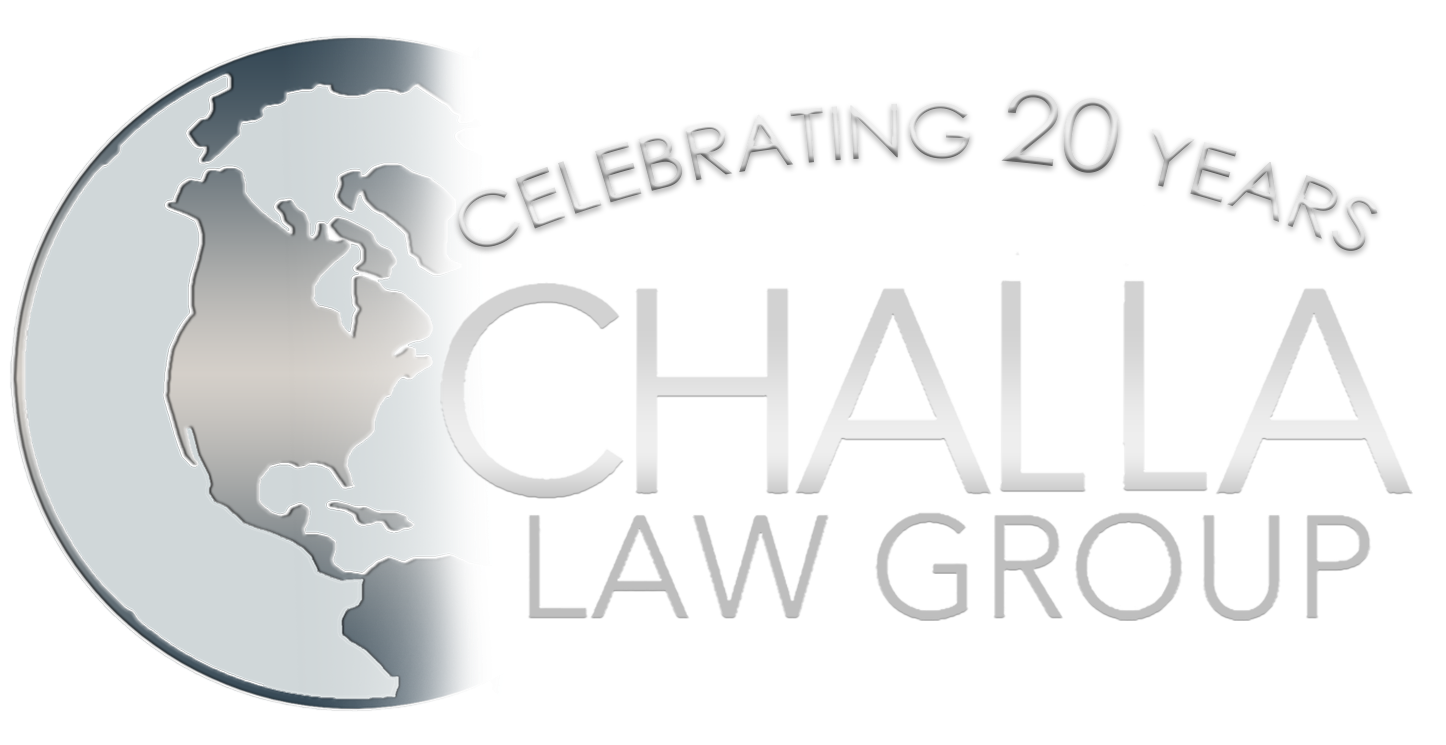
Business Visas
H-1B Visa
The H-1B visa is used by U.S. businesses to hire foreign workers in “specialty occupations.” These positions require specialized knowledge and a minimum of a bachelor’s degree to qualify. The H-1B is a highly sought visa, partly due to the annual cap of 85,000 visas awarded, 20,000 of which are reserved for advanced degree holders with specific knowledge related to the position. This is not a self-petition visa, meaning that a U.S. employer must sponsor the foreign national’s petition.
The H-1B is issued for three years, with a possible extension for a maximum of six years. Once these six years are completed, the employee must leave the U.S. for one year to become eligible for the H-1B visa again. Alternatively, the employee can apply for a change of status while in the United States prior to the ending employment date.
While in the U.S. on an H-1B, your spouse and any unmarried children under the age of 21 may accompany you under H-4 status. The H-4 visa does not allow employment without a separate application for work authorization.
H1-B1 Visa
The H-1B1 visa is similar to the H-1B and is for persons in “specialty occupations.” This new category was created by the U.S.-Chile Free Trade Agreement and the U.S.-Singapore Free Trade Agreement.
In order to qualify for H-1B1 classification, the applicant must have theoretical and practical application of specialized knowledge and must have at least a U.S. bachelor’s degree or its equivalent AND the job sought must require at least a bachelor’s degree or its equivalent. Because this is not a self-petitioning category, the applicant must have a sponsoring employer in the U.S.
The spouse and unmarried children below the age of 21 of an H-1B1 worker are allowed to accompany this individual as H-4 dependents. However, they cannot work unless they qualify for a work visa. H-4 dependents, however, can enroll and attend schools in the U.S. without obtaining a student visa.
STEPS
Because the H-1B1 visa requires a U.S. sponsor, the applicant must obtain a written offer of employment from a U.S. employer. Unlike the H-1B visa, there is no need for the employer to file an I-129 Petition with the USCIS in the U.S. However, like the H-1B, a prevailing wage needs to be obtained and a Labor Condition Attestation (LCA) needs to be filed.
DOCUMENTS
Both the applicant and the employer are required to submit documents for the H-1B1 visa. The applicant is required to submit the following documents when applying for an H-1B1 visa abroad:
The employer needs to provide the following:
- Copy of the certified LCA.
- A written offer of employment.
H-2A Visa
The H-2A Visa is the most functional of all visa categories. It fills a specific need for both the U.S. and for foreign nationals. This visa allows foreign workers entry into the U.S. for temporary work in agriculture. However, the H-2A visa is problematic: growers don’t like the limits of the visa and workers’ rights advocates don’t believe the laws provide enough support for workers.
The H-2A visa is not self-petitioned. Employers must prove that there are no U.S. workers available to perform the work to be completed. Although this is a temporary visa, it can be extended for up to three years.
Workers’ spouses and unmarried children under the age of 21 are allowed to join them in the U.S. under the H-4 status. Dependents are not permitted to work unless they personally qualify for a work visa.
H-2B Visa
While a limited number of H-2B Visas are issued each year, the visa is nonetheless useful. The H-2B visa enables U.S. businesses, such as hotels, construction companies, and landscapers, to fill temporary needs for nonimmigrant workers. This visa is also occasionally used to hire professional basketball or hockey players. Many individuals who are unable to obtain an O or P Visa decide to apply for this visa instead. The visa is not self-petitioned, which means you will need an employer to sponsor you.
Your spouse and unmarried children under the age of 21 may join you in the U.S. under the H-4 status. Dependents are not permitted to work unless they personally qualify for a work visa.
H-3 Visa
The H-3 Visa is specifically designed to enable workers in “any field of endeavor” to train in the U.S. (USCIS). Although this loose classification includes agriculture, technology, communications, and governmental leadership, it does not apply to people seeking graduate medical training.
This visa can also be used by people entering the U.S. to receive training in special education “of children with physical, mental, or emotional disabilities” (USCIS).
Your spouse and unmarried children under the age of 21 may join you in the U.S. under the H-4 status; however, these dependents are not permitted to work.
Documents
Along with the requisite application documents, the H-3 Visa requires your employer to provide the following:
- Proof that this training is not available in your home country, and that this training will aid you in your career.
- Proof that you will not engage in willful employment while in the U.S. in your career.
- Proof that the training is formal in nature.
L-1 Visa
Through the L-1 visa, businesses that function both in the U.S. and in their home country can benefit from the best of what each area has to offer. The L-1 visa is open to international organizations with offices in the U.S. who temporarily transfer employees to their U.S. office. This visa is sometimes referred to as the “intra-company transferee” visa.
To obtain an L-1 visa, you must be able to prove that you have worked for the non-U.S. company for at least one full year within the last three years as an executive, manager, or employee with specialized knowledge.
The L-1 visa enables the transfer of managers, executives, and specialized knowledge personnel to a U.S. office, subsidiary or affiliated company. This visa comes in the following categories:
- L-1A visas – for executives and managers.
- L-1B visas – for personnel with specialized knowledge.
L-1A workers may work for up to seven years. L-1B visa holders may work for five years.
Your spouse and unmarried children under the age of 21 may join you in the U.S. through L-2 status. L-2 status spouses are allowed to work.
Blanket L-1 petitions are available to employees of eligible pre-certified multi-national corporations, allowing those seeking an L-1B visa to apply directly at the consulate and forgo the filing of an L-1B petition with the USCIS. We recommend that certified companies use a mixed approach, reserving the blanket option for their strongest candidates.
O-1 Visa
The O-1 Visa is for outstanding individuals. The visa enables people with extraordinary ability in the sciences, arts, education, business, athletics, motion picture or television industry to enter the U.S. for temporary periods of time. The spectrum of eligible individuals in this loosely-defined category also includes chefs, carpenters and lecturers.
The O-1 Visa must be petitioned by a U.S. employer, U.S. agent or foreign employer through a U.S. agent. Your spouse and unmarried children under the age of 21 may join you in the U.S. under O-3 status, but they may not work.
To be considered an outstanding individual, you should be highly regarded in your field, and can only work in the U.S. in that area of expertise. The applicant may be required to provide documentation of a portion of the following:
- A contract for employment.
- A printed article or statement from either a person or group proficient in your field. This person/group should support your status as a respected member of your field.
- That the applicant has been the recipient of a major award, such as a Nobel Prize.
- That the applicant is a member of one of the leading associations in his or her field.
- That the applicant has done original research in his or her field.
- Published articles in major trade publications or other media by or about the applicant’s accomplishments in his or her field.
- “A high salary or other remuneration for services” (USCIS).
- That the applicant has been invited to judge a competition or take part in a panel discussion.
- “Employment in a critical or essential capacity for organizations and establishments that have a distinguished reputation” (USCIS).
O-2 Visa
O-2 visas are offered to support personnel of O-1 Visa holders in the fields of athletics, entertainment, and motion picture and television production. This status is not applicable to personnel in the sciences, business, or education.
The O-2 Visa must be petitioned by a U.S. employer, U.S. agent or foreign employer through a U.S. agent. Your spouse and unmarried children under the age of 21 are permitted to accompany you to the U.S. under O-3 status. Your dependents must prove immediate relation to you, and will not be allowed to work.
P-1 Visa
Artists and athletes are essential to healthy cultural exchange. The global community benefits greatly from the work of each country’s greatest thinkers and performers. P-1 visas are issued to entertainers, circus artists, and athletes who wish to work in the U.S.
Outstanding athletes may apply for this visa in order to compete in the U.S., either as individuals or as members of an internationally recognized athletic team.
Entertainment groups with an outstanding international reputation can be granted P-1 classification as a unit; however, individual entertainers within these groups cannot apply for separate visas.
The employer of P-1 visa applicants who are athletes may be asked to provide the following:
- A letter from “an appropriate labor organization” (USCIS).
- A contract with a major U.S. sports league or team.
- Proof of “significant participation in a prior season with a major United States sports league” (USCIS).
- Proof that the applicant has taken part in “international competition with a national team” (USCIS).
- Proof of “significant participation in a prior season for a U.S. college or university in intercollegiate competition” (USCIS).
- Letters demonstrating that the athlete or team is internationally renowned.
- Proof that the individual or team is ranked, “if the sport has international rankings; or [that] the alien or team has received a significant honor or award in the sport” (USCIS).
The employer of P-1 visa applicants who are entertainers may be asked to provide the following:
- A letter from “an appropriate labor organization” (USCIS).
- Proof “that the group has been established and performing regularly for at least one year” (USCIS).
- Proof that the group has received ” international awards or prizes for outstanding achievement in the field, or evidence of at least 3 of the following:
- The group has performed and will perform as a starring or leading entertainment group in productions or events which have a distinguished reputation as evidenced by critical reviews, advertisements, publicity releases, publications, contracts, or endorsements;
- The group has achieved international recognition and acclaim for outstanding achievement in its field, as evidenced by reviews in major newspapers, trade journals, magazines or other published material;
- The group has performed and will perform services as a leading or starring group for organizations and establishments that have a distinguished reputation, as evidenced by articles in newspapers, trade journals, publications, or testimonials;
- The group has a record of major commercial or critically acclaimed successes, as evidenced by indicators such as ratings, box office receipts, record, cassette or video sales, and other achievements as reported in trade journals, major newspapers or other publications;
- The alien has received significant recognition for achievements from critics, organizations, government agencies or other recognized experts in the field in which the alien is engaged, with the testimonials clearly indicating the author’s authority, expertise and knowledge of the alien’s achievements; or
- The group has commanded and will command a high salary or other substantial remuneration for “services comparable to others similarly situated in the field, as evidenced by contracts or other reliable evidence” (USCIS).
P-2 Visa
P-2 Visas are issued to troupes or bands entering the U.S. as part of an exchange program. Either the U.S. labor group that negotiated the exchange agreement, the sponsoring organization or the U.S. employer must file the petition. P-2 applicants may be asked to provide the following:
- “A written consultation by an appropriate labor organization” (USCIS).
- “A copy of the formal reciprocal exchange agreement between the U.S. organization(s) sponsoring the alien and the organization(s) in a foreign country which will receive the U.S. artist or entertainer” (USCIS).
- A letter from the sponsoring organization describing the exchange which is to take place.
- Proof that the nonimmigrant visa petitioner and the U.S. artist or entertainer have “comparable skills and that the terms and conditions of employment are similar” (USCIS).
- Proof of the agreement between the organizations involved in the exchange.
P-3 Visa
Education is paramount to the exchange of ideas and beliefs between nations. The P-3 visa allows “culturally unique” artists and entertainers to travel to the U.S. for temporary positions as performers, teachers or coaches.
Either the sponsoring organization or the U.S. employer must file the P-3 visa application. P-3 applicants may be asked to provide the following :
- A letter from the labor organization.
- Letters regarding the culturally unique individuals skills and talents in his or her field.
- Proof that “all of the performances or presentations will be culturally unique events” (USCIS).
- Articles and reviews in respected newspapers, journals and magazines that prove that the event will be culturally unique.
R-1 Visa
The R-1 Visa enables religious workers to temporarily enter the U.S. A religious vocation is defined as a calling to religious life, demonstrated by a lifelong commitment such as taking vows. Nuns, monks, and religious brothers and sisters are examples of religious workers.
This classification includes liturgical workers, religious instructors or cantors, catechists, workers in religious hospitals, missionaries, religious translators, and religious broadcasters. However, this classification does not include janitors, maintenance workers, clerks, fundraisers, or solicitors of donations.
The R-1 applicant must demonstrate that he or she has belonged to a nonprofit religious organization in the U.S. for at least the two years. The U.S. petitioning organization must be a tax-exempt nonprofit religious organization that is able to afford to pay and provide room and board for the religious worker. Religious workers who live outside the U.S. should apply for the R-1 visa with their consulate. Religious workers who are already in the U.S. may ask their employer “to petition for a change of status, extension of stay, or change of employment” (USCIS).
R-1 visa holders may remain in the U.S. for up to five years.
Spouses and/or unmarried children under 21 years of age may accompany the religious worker to the U.S. under R-2 status. R-2 visa holders are not authorized to work while in the U.S., but may attend school.
The petitioning organization may also be asked to provide the following :
- Written proof that the applicant has been employed by the organization for two years.
- A statement outlining the potential position (including “salary, benefits, and other compensation”) and the applicant’s qualifications for the work to be performed (USCIS).
- The name and address of the organization where the religious worker will be employed.
- Proof of “the organization’s affiliation with the denomination” in question (USCIS)..
TN Visa
Under the North American Free Trade Agreement (NAFTA), certain citizens of Canada and Mexico are eligible to enter the U.S. to work temporarily under nonimmigrant TN status.
The following are the requirements to be eligible for the TN Visa:
- The profession must be on the NAFTA list.
- The foreign national must possess the necessary training for that profession.
- The proposed position must be classified as a professional position.
- The foreign national must work for a U.S. employer.
Canadian Citizens may apply for the TN-1 Visa, and Mexican citizens may apply for the TN-2 Visa. Please note that the process for obtaining a TN-2 Visa is much more complicated than that of the TN-1.
Spouses and/or unmarried children under the age of 21 are eligible to enter the U.S. under the derivative TD-1 and TD-2 visas. Family members may study in the U.S., but they are not allowed to work.
TN-1 Visa
Canadian citizens applying for the TN-1 Visa must provide the following information at a U.S. port of entry:
- A document from the employer outlining the job duties, the length of the assignment, and the agreed-upon salary.
- Proof that the employee has completed the necessary education or training for the position.
- Proof that the employee has all of the necessary licenses for the position.
- Proof of Canadian citizenship.
Canadian citizens need not file a petition for employment; they must simply obtain TN status at a port of entry.
TN-2 Visa
Mexican citizens are eligible to apply for the TN-2 Visa. Unlike Canadian citizens, Mexican applicants must apply at the U.S. consulate in their home country. Interested applicants must meet the following requirements:
- A document from the employer outlining the job duties, the length of the assignment, and the agreed-upon salary.
- Proof that the employee has completed the necessary education or training for the position.
- Proof that the employee has all of the necessary licenses for the position.
- Proof of Mexican citizenship.
Contact us to schedule an appointment with us today to discuss the right work visa for your specific situation. We are proud to serve clients in Richmond, VA, and the surrounding areas through the use of our unique international perspective.





















